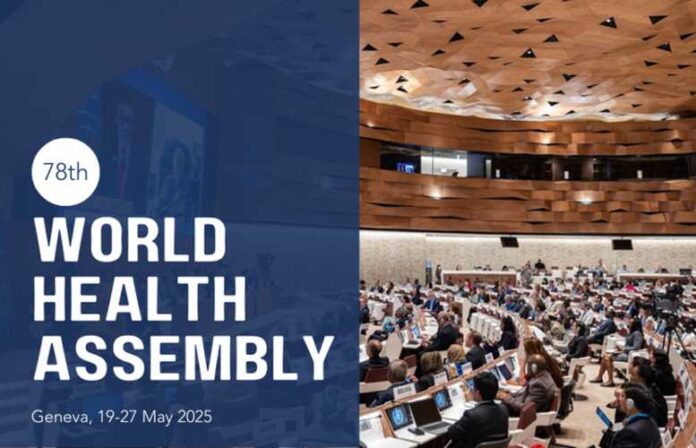By: Staff Writer
May 19, Colombo (LNW): Sri Lanka stands to unlock significant health and diplomatic advantages through active participation at the 78th World Health Assembly in Geneva, Switzerland, this week.
With global health challenges evolving rapidly, this prestigious platform organized by the World Health Organization (WHO) presents an opportunity for Sri Lanka to align with international health standards, influence policymaking, and attract technical and financial support for national health initiatives.
Minister of Health and Mass Media Dr. Nalinda Jayatissa departed for Switzerland on Saturday (May 18) to attend the Assembly, which will be held from May 19 to 27 under the theme “One World for Health.”
The event convenes health ministers and over 15,000 government officials from across the globe to engage in high-level discussions, share innovative strategies, and develop actionable policies aimed at improving global public health.
Joining Minister Jayatissa at the Assembly are Dr. Anil Jasinghe, Secretary to the Ministry of Health, Sri Lanka’s Permanent Representative to the United Nations in Geneva, Himali Arunatilaka, and First Secretary Nishanthini Victor, along with other key officials. Together, this delegation represents Sri Lanka’s voice in the global health community.
Participation in this Assembly enables Sri Lanka to engage in critical policy dialogues, gain exposure to emerging research and best practices, and forge strategic collaborations with other countries.
It is a chance to influence global health agendas while also advocating for Sri Lanka’s own pressing health priorities—such as managing non-communicable diseases, improving maternal and child health, and enhancing public health preparedness for future pandemics.
Key Benefits for Sri Lanka:
Policy Influence:
As an active member state, Sri Lanka can shape international health policies to ensure they reflect the country’s specific needs and contexts. This engagement bolsters the country’s ability to safeguard its public health interests on the global stage.
Access to Resources:
Direct engagement with WHO and allied bodies could open channels for technical assistance and funding, particularly for infrastructure development, emergency preparedness, and disease control programs.
Health Diplomacy and Collaboration:
The Assembly provides a rare opportunity to strengthen diplomatic ties, build partnerships, and explore joint ventures in healthcare delivery, research, and training. Such collaboration could lead to formal agreements and long-term support.
Showcasing Achievements:
Sri Lanka’s public health successes, such as universal vaccination and free healthcare services, can be shared globally, enhancing its reputation and encouraging further cooperation with international health agencies.
Adopting Best Practices:
Learning from other nations facing similar health challenges allows Sri Lanka to refine its national strategies with innovative, evidence-based approaches.
Strategic Alignment:
Participation helps align Sri Lanka’s health policies with international frameworks such as the Sustainable Development Goals (SDGs) and Universal Health Coverage (UHC).
To maximize these benefits, the Ministry emphasizes the importance of a focused agenda, active engagement during the Assembly, and a robust post-conference action plan to implement insights gained and follow up on potential partnerships.

